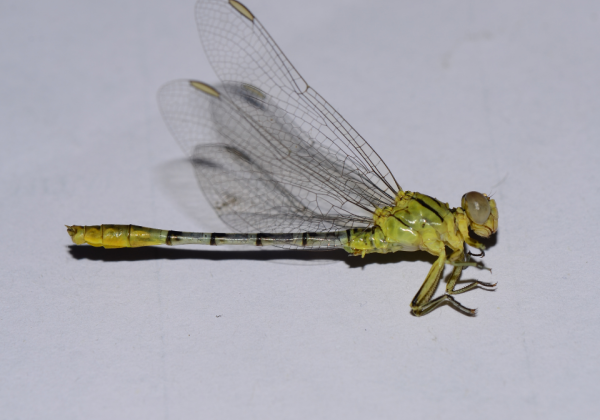Important Facts For Prelims
Platygomphus Benritarum
- 04 Jun 2022
- 3 min read
Why in News?
Recently, a new species of dragonfly ‘Platygomphus benritarum’ discovered in Assam has been named after two women for their pioneering work in the northeast.
- It has been named after Monisha Behal, a founder member of Northeast Network (NEN) and Rita Banerji, founder of Green Hub.
What are the Key Points?
- The species, a single male, was found by two researchers in June 2020 near the banks of the Brahmaputra in Assam.
- The male observed appeared to have freshly emerged judging by its shiny wings and abdomen.
- It has turquoise blue eyes and dark brown face covered with hair on the sides, was found resting on a large tree around 5-6 metres from the banks of Brahmaputra.
- The habitat along the banks is dominated by grasses, sparse trees, paddy fields and marshlands, along with some forest patches and tree plantations.
- Dragonflies and damselflies belong to the order Odonata of insects.
- The order Odonata ("toothed ones") includes some of the most ancient and beautiful insects that ever roamed Earth, as well as some of the largest flying invertebrates ever to have lived.
- Odonata consists of three groups: Anisoptera (which includes dragonflies), Zygoptera (which includes damselflies), and Anisozygoptera (a relict group represented by only two living species).
What are Dragonflies?
- About:
- It is an aerial predator insect most commonly found near freshwater habitats throughout most of the world.
- Their distinctive colors make them look beautiful. This makes them valuable subjects for research on insect behavior, both for ecology and art.
- Habitat:
- Most species of dragonflies live in the tropics and particularly in the rainforests.
- Significance:
- Dragonflies act as important bio-indicators of the ecological health of an area. As they feed on mosquitoes and other insects that are vectors to life-threatening diseases like Malaria and Dengue.
- Threats:
- The rapid destruction of their habitat poses a direct threat to their survival making their conservation urgent.





